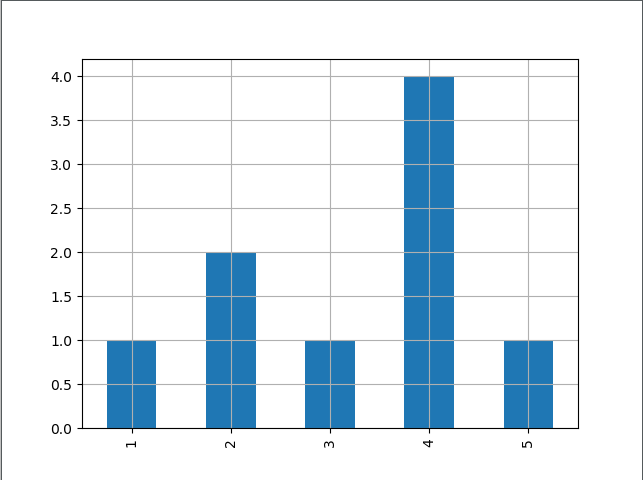import matplotlib.pyplot as plt
import numpy as np
df2 = pd.Series([1,2,1,4,1],index=[1,2,3,4,5]) #
print(df2)
#df2.plot()
df=pd.DataFrame({1:[1,1,4,3],2:[1,2,3,4]})
#pd.DataFrame.hist(df,column=[1])
#a=df.hist(orientation="vertical",histtype="stepfilled")
#fig, ax = plt.subplots()
df2.plot(grid=True,kind="bar",use_index=True) # 使用pd.Series 中的index坐位x轴 使用 use_index 默认是True
#pd.Series.hist(df2)
#df2.plot(kind="bar") # kind指定类型 kind="hist" 相当于 pd.Series.hist(df2) 叠加图形 df2 = pd.Series([1,2,1,4,1]), 1有3个, 1的纵轴就是3格, 2,4就是1 格
plt.show()
###############
kind : str
- 'line' : line plot (default)
- 'bar' : vertical bar plot
- 'barh' : horizontal bar plot
- 'hist' : histogram
- 'box' : boxplot
- 'kde' : Kernel Density Estimation plot
- 'density' : same as 'kde'
- 'area' : area plot
- 'pie' : pie plot
- 'scatter' : scatter plot
- 'hexbin' : hexbin plot

Make plots of Series or DataFrame using the backend specified by the
option ``plotting.backend``. By default, matplotlib is used.
Parameters
----------
data : Series or DataFrame
The object for which the method is called
x : label or position, default None
Only used if data is a DataFrame.
y : label, position or list of label, positions, default None
Allows plotting of one column versus another. Only used if data is a
DataFrame.
kind : str
- 'line' : line plot (default)
- 'bar' : vertical bar plot
- 'barh' : horizontal bar plot
- 'hist' : histogram
- 'box' : boxplot
- 'kde' : Kernel Density Estimation plot
- 'density' : same as 'kde'
- 'area' : area plot
- 'pie' : pie plot
- 'scatter' : scatter plot
- 'hexbin' : hexbin plot
figsize : a tuple (width, height) in inches
use_index : bool, default True
Use index as ticks for x axis
title : string or list
Title to use for the plot. If a string is passed, print the string
at the top of the figure. If a list is passed and `subplots` is
True, print each item in the list above the corresponding subplot.
grid : bool, default None (matlab style default)
Axis grid lines
legend : False/True/'reverse'
Place legend on axis subplots
style : list or dict
matplotlib line style per column
logx : bool or 'sym', default False
Use log scaling or symlog scaling on x axis
.. versionchanged:: 0.25.0
logy : bool or 'sym' default False
Use log scaling or symlog scaling on y axis
.. versionchanged:: 0.25.0
loglog : bool or 'sym', default False
Use log scaling or symlog scaling on both x and y axes
.. versionchanged:: 0.25.0
xticks : sequence
Values to use for the xticks
yticks : sequence
Values to use for the yticks
xlim : 2-tuple/list
ylim : 2-tuple/list
rot : int, default None
Rotation for ticks (xticks for vertical, yticks for horizontal
plots)
fontsize : int, default None
Font size for xticks and yticks
colormap : str or matplotlib colormap object, default None
Colormap to select colors from. If string, load colormap with that
name from matplotlib.
colorbar : bool, optional
If True, plot colorbar (only relevant for 'scatter' and 'hexbin'
plots)
position : float
Specify relative alignments for bar plot layout.
From 0 (left/bottom-end) to 1 (right/top-end). Default is 0.5
(center)
table : bool, Series or DataFrame, default False
If True, draw a table using the data in the DataFrame and the data
will be transposed to meet matplotlib's default layout.
If a Series or DataFrame is passed, use passed data to draw a
table.
yerr : DataFrame, Series, array-like, dict and str
See :ref:`Plotting with Error Bars <visualization.errorbars>` for
detail.
xerr : DataFrame, Series, array-like, dict and str
Equivalent to yerr.
mark_right : bool, default True
When using a secondary_y axis, automatically mark the column
labels with "(right)" in the legend
`**kwds` : keywords
Options to pass to matplotlib plotting method
Returns
-------
:class:`matplotlib.axes.Axes` or numpy.ndarray of them
If the backend is not the default matplotlib one, the return value
will be the object returned by the backend.
Notes
-----
- See matplotlib documentation online for more on this subject
- If `kind` = 'bar' or 'barh', you can specify relative alignments
for bar plot layout by `position` keyword.
From 0 (left/bottom-end) to 1 (right/top-end). Default is 0.5
(center)


